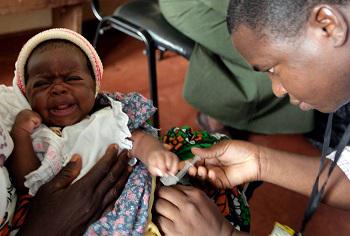
A lack of early testing for HIV and widespread stigma has left four-fifths of children with the virus in West and Central Africa without life-saving drugs, meaning that tens of thousands could die within years, aid agencies said on Wednesday.
Around 400,000 children under 15 with HIV in the region do not receive antiretroviral (ARV) treatment because they have not been tested, according to the U.N. children's agency, UNICEF.
Without early testing and ARV drugs, half of babies with HIV - the virus that causes AIDS - will die before turning two, and three quarters before their fifth birthday, health experts say.
Limited testing in the region could hinder a global drive by the U.N. AIDS program (UNAIDS) to ensure that by 2020 almost all people with HIV know their status and receive treatment.
"It is absolutely urgent to fast-track early testing of HIV among children in the region," said UNICEF's regional director Marie-Pierre Poirier. "The vast majority of children who are tested early enough now have access to ARV therapy."
For the first time in the history of the HIV epidemic, West and Central Africa in 2015 recorded the largest number of new infections among children, with 66,000 cases - 45 per cent of the 150,000 new cases registered worldwide - UNAIDS said.
Only half of women in the region have undergone programs for prevention of mother-to-child transmission, leaving more children at higher risk of acquiring HIV during pregnancy, birth and breastfeeding, then going undetected, according to UNICEF.
Poor testing procedures at local hospitals and primary health care centers mean that on average, only one in seven infants across West and Central Africa are tested for HIV during the first two months of their life, UNICEF data shows.
Fear and stigma related to HIV also prevents mothers from getting their children tested, health experts say.
"Mothers have said to our staff: 'We don't want to be an HIV family,'" Gilles van Cutsem, an expert on HIV with Medecins Sans Frontieres (MSF), told the Thomson Reuters Foundation.
"Of the ... children diagnosed with HIV who are lucky enough to receive treatment, the majority are never told they have HIV until they find out by themselves during adolescence, which lowers their chances of sticking with the treatment," he added.
Some 36.7 million people worldwide have HIV, which is spread through blood, semen and breast milk. Only around half have access to treatment, and many do not know they have the virus.
Source: Reuters
http://www.reuters.com/article/us-aids-africa-children-idUSKBN16M2JO
 FR
FR EN
EN AR
AR








